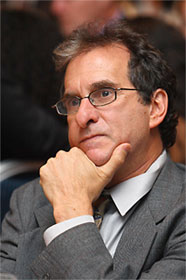On Transit Advocacy, Working Families Party Misses the Mark Again
Yesterday I received an email from the Working Families Party with the subject line "Students to confront MTA Board on MetroCard cuts." It seemed as though the WFP had surveyed the sorry state of transit finances in New York and decided that the MTA Board is a worthy target. As for the state legislature’s theft of MTA funds and lawmakers’ repeated failure to properly fund the transit system — well, there was no sign that Albany is facing pressure from the WFP.
 WFP chair Dan Cantor. Photo: City Hall
WFP chair Dan Cantor. Photo: City HallI spoke to WFP press contact Bryan Collinsworth and asked why the party is drawing attention to the MTA Board when there’s a very straight line connecting Albany legislators to the current funding shortfall.
"Our plan at this point is to push on all three," he said, meaning the MTA, Mayor Bloomberg, and Albany. Next on their list, he indicated, is Bloomberg, "the one in a position to make things move at the moment." He later mentioned Governor Paterson by name as well.
Flushing out the mayor is all well and good. And New York is better off if the governor withdraws his proposal to fund transit by shifting the tax burden to the city. But while Collinsworth said the WFP wants to "get legislators to admit" that we need a more comprehensive solution, he never named the most powerful person in New York state — Assembly Speaker Sheldon Silver. He never raised the prospect of
targeting State Senate obstructionists like Carl Kruger and Pedro
Espada.
By now, it should be abundantly clear that we’re looking at a funding shortfall which the MTA Board can’t fix without making life miserable for transit riders. An advocacy strategy that deflects attention from Albany insulates those with real power from the public pressure they should be forced to reckon with.
Last fall, the party’s candidates emerged victorious from crowded fields in two citywide elections, and several more gained seats in the City Council. The WFP website claims that "Democratic weakness and bowing to corporate interests is why the Working Families Party exists." When it comes to transportation policy and our Democratic legislators’ penchant for dodging progressive reforms, however, the WFP hasn’t been much of a spine-stiffener.
The WFP was a non-entity in the public debate when congestion pricing came up in Albany in 2008, and again last year when bridge tolls needed just a few more votes to clear the State Senate. Even though we know that funding transit with road pricing can now help
save working families in New York $2,300 per year, the same pattern holds true today.
"We’re still taking the temperature of the viability of
the different funding options out there," said Collinsworth. "I can’t say that there’s one
that we favor."